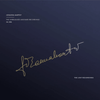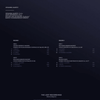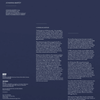







Johanna Martzy - The unreleased and rare recordings (2LP, Mono)
ORDER LIMITED TO ONE ITEM PER CUSTOMER
Johanna Martzy, violin
Jean Antonietti, piano (A1-4, B1-3, D1-3)
Radio Filharmonisch Orkest conducted by Willem von Otterloo (C1-3)
2 LPs, gatefold jacket printed in Italy including a limited time 16-bit album download card
Limited to 2,000 numbered copies
Original analog Master tape : YES
Heavy Press : 180g
Record color : black
Speed : 33RPM
Size : 12'’
Mono
Studio
Record Press : Marciac Workshop Pressings, France
Label : The Lost Recordings
Original label : The Lost Recordings
Recorded at the Jesus-Christus Kirche, Berlin on November 14th 1955 (A1-4, B1-3), at the Concertgebouw, Amsterdam on November 25th 1961 (C1-3), at VARA studio, Hilversum, Netherland on January 27th 1965 (D1-3)
Remastered by The Lost Recordings
Lacquer cut by Kevin Gray at Cohearent Audio
Originally released in March 2023
Tracks:
Side A: Handel - Sonata for violin and basso continuo in F major, HMV 370
- Adagio
- Allegro
- Largo
- Allegro
Side B: Mozart - Violin Sonata in B-flat major, KV 454
- Largo - Allegro
- Andante
- Allegretto
Side C: Mozart - Violin Concerto, No. 3 in G major, K. 216
- Allegro
- Adagio
- Rondeau: Allegro
Side D: Ravel - Violin Sonata in G major, No. 2, M. 77
- Allegro
- Blues
- Perpetuum Mobile
Reviews :
“God has given you all that you need … You must play as one of the first ten, not as the first fifty violinists”. These were the words of Jenő Hubay, Johanna Martzy’s teacher at the Liszt Academy of Budapest, when she was thirteen years old. She could not guess that she was fated to lead the life of a comet traversing an unremitting succession of light and shadowThe professional career of the young girl took off to a meteoric start. In 1943, she made her first performance in Budapest, playing the Tchaikovsky concerto under the baton of the great Willem Mengelberg. But the Nazi occupation of Nazis of Hungary, still part of the Axis, put a halt to the career of the young Jewish artist. She and her husband were sent to an Austrian internment camp, where they remained until the end of the war.
Perhaps it was the recollection of her teacher’s prediction that made her take up her violin again. In October 1947, she won the first prize of the Geneva Competition. Success was close at hand, and touring commenced: Amsterdam in 1949, New York in 1957 and then 1958, with young Leonard Bernstein conducting. However, personal setbacks began: she had to face permanent machinations concerning alleged questionable political affinities with Regent Mikklos Horthy in Hungary during world war two. In Edinburgh, in 1959, the Czech Philharmonic Orchestra refused to perform with her. As a result of her stormy relationships with record companies, she made few recordings. Musical critics, too, did not spare their harsh words, with some saying that her talent was deceptive. Her career took on a chaotic path, as it alternated between resounding praise and ignorance. Johanna remained proud and steadfast through the turmoil, determined to maintain her authenticity. It was a line from which she never wavered.
The Lost Recordings has been fortunate to be able to revive hitherto unpublished studio and concert recordings from Berlin and Amsterdam, made between 1955 and 1965. They testify to the outstanding talent of Martzy, the comet of the musical world. Because these recordings are so old, they required significant restoration to bring the depth and brilliance of her playing back to life.
In 1955, in the Jesus-Christus church of Berlin, Martzy recorded Handel’s Sonata for Violin and Basso Continuo with pianist Jean Antonietti, as well as Mozart’s Sonata in B Major. Each tempo is rigorous and there are none of the mannerisms so common at the time, expressing her striving to achieve the most colourful musical sounds. Each phrase is a world that is rich in itself.
On 25 November 1961, she performed at the Concertgebouw in Amsterdam, where Willem van Otterloo was conducting the Radio Filharmonisch Orkest, the Dutch radio orchestra. Performing this concerto often exhausted Martzy, even though she was particularly fond of it. The recording here illustrates just how unfounded were the criticisms made of her. So uncompromising was she that no pretence was possible; she lived the work from its interior. Her limpid playing is in luminous harmony with the orchestra, which, at several points, she draws to the highest peaks of music. The emotion is all-encompassing. It was often believed that Martzy dared not play the works of twentieth century composers. But her interpretation of Ravel displays vivacity and a sense of rhythm that pay apposite tribute him. Her vision of his sonata for violin, recorded in January 1965 at the Hilversum studio with pianist Franz-Paul Decker, is both dynamic and intimate. But that same year, her career began to fade. She chose to gradually leave the stage and took refuge in Switzerland. There, she died, unknown to almost all, in 1979 aged fifty-five.
What injustice! The great Glenn Gould considered that she was the most underestimated of the major violinists of her time. Today, the error is remedied.



